7 Ways to Stop Procrastinating in 2024 (+Free Templates)
Procrastination is the action of delaying or postponing something. It typically occurs if the task is too difficult, boring, or when you just don’t feel like co...
Procrastination is the action of delaying or postponing something. It typically occurs if the task is too difficult, boring, or when you just don’t feel like completing it here and now. In this article, you'll learn how to stop procrastinating and more done with less.
So, is procrastination as bad as they say?
Most of us are guilty of putting off tasks once in a while. And most of the time, it's not a big deal. But procrastination can become a problem if it turns chronic. When that happens, constantly putting things off saps productivity and prevents you from accomplishing your goals.
🙈
Missing deadlines is not for the faint of heart. But the good news is you can easily avoid stress and anxiety by using the common-sense strategies we cover in this article.
Let’s start from the beginning.
🎮 Why Do We Procrastinate?
Procrastination isn't actually a weakness. It's just an excuse we use to avoid doing things that we don't want to do. It happens when our minds start thinking about all the reasons why we shouldn't be doing something instead of focusing on the benefits of doing it.

The awful truth is that nobody is 100% immune to procrastination. Even the most productive types tend to put things off once in a while. But some of us are chronic procrastinators.
"[...] while everyone may delay a task, there are as many as 20 percent of normal adult men and women from around the world who make procrastination their maladaptive lifestyle – postponing at home, at work, at school, in relationships, this is their way of life."
Joseph Ferrari, Ph.D.
Some people procrastinate because they don't know where to start. Others delay tasks because they seem too complex or time-consuming. Procrastination can also have less obvious causes, like the fear of failure that prevents you from starting a new, big project.
⚡ 7 Effective Steps to Stop Procrastinating
The best way to overcome procrastination is to see the positive aspects of a task—focus on the reward after completing the task rather than the effort and time required.
But that’s just a start.
Here are the promised tips that’ll help you overcome procrastination and get stuff done.
1. Make a To-Do List (And Keep It Short)
Sounds simple, right?
But here’s the thing. Making a to-do list will not only help you remember the stuff you need to do. It’ll also keep you accountable and compelled to finish the tasks you put on it.
Here’s how to create your bulletproof to-do for the day:
💡 Write down everything you need to do on a given day, ideally the day before.
🤹 Stick to 3-5 most important tasks you can’t afford to delay.
⏰ Be precise—specify the date, time, and people involved.
🧱 Break big tasks into bite-sized chunks that are easier to complete.
Ready? Great. Now it’s time to decide what to do first.
Prioritize your tasks by importance, urgency, and difficulty. This way, you'll know exactly where to focus your efforts. Ask yourself: “How much time do I need to complete this task?”, ”Is it difficult or relatively easy?”, “Do I need to work with other people to complete it?”
Here's a simple weekly goals template that'll help you get started! 👇
2. Set Deadlines for Each Task
There are tasks that get done, and there are those that are always in motion, slipping from one day to the next. Instead of checking them off, you keep postponing them with no end in sight.
If you want to actually finish the tasks on your to-do list, you need to set clear deadlines for each. Putting boundaries on work and personal obligations makes you more likely to fulfill them. It also gives you something to look forward to, which is a strong motivation in itself.
You can create a deadline by setting a specific date and time for each task. However, if you prefer a more flexible approach, try setting milestones, e.g. by creating sub-tasks for each task. This approach will give you a powerful sense of accomplishment as you move forward.
3. Start With the Most Important Tasks (Big Rocks)
Tasks can be divided into rocks and pebbles. The first are your big obligations that are usually the most difficult to complete. The second are secondary tasks that are “quick” and “easy.”
It may be tempting to start with the “fun” gigs and then move on to more demanding work.
But you should do just the opposite.
It’s important to deal with the most demanding tasks while your focus, motivation, and energy are at their peak. As you move through the day, all those resources will dry out, so you’ll find it more difficult to approach time-consuming and cognitively demanding tasks.
Need help prioritizing your tasks?
With Taskade AI, you can select multiple items on your to-do list and use the /prioritize command to organize tasks by impact and importance. Magic! 🪄
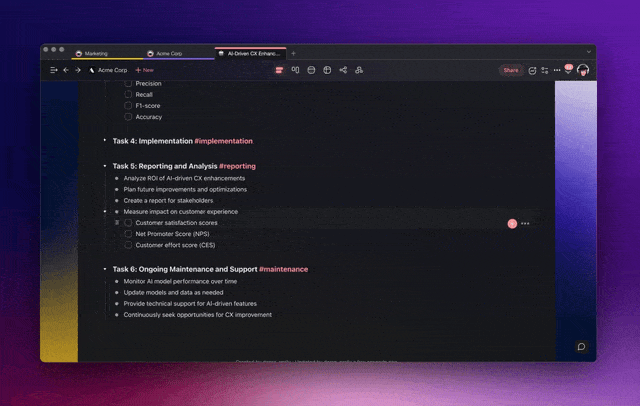
4. Focus On One Task at a Time
Multitasking may seem like a great idea. After all, typing that long-overdue report during a boring video conference makes you feel twice as productive. Except it’s not.
Whenever you try to do two (or more) things at once—think reading a text in the middle of a conversation—you’re actually switching between tasks. That leads to what’s called the cognitive switching penalty, which is the time it takes your brain to refocus on a task after a distraction.
"Although switch costs may be relatively small, sometimes just a few tenths of a second per switch, they can add up to large amounts when people switch repeatedly back and forth between tasks. Thus, multitasking may seem efficient on the surface but may actually take more time in the end and involve more error."
"Multitasking: Switching Costs" by the American Psychological Association(2)
So, the next time you’re tempted to multitask, keep in mind that you’re actually dividing your attention between tasks. And despite what some job offers might tell you (sorry HRs of the world), branding yourself as a “multitasker” means you’re just terrible at your job.
5. Use Focus-Boosting Tools
Procrastination is almost too easy these days. It doesn’t matter if you’re working at home or at the office, there are hundreds of sneaky distractions lurking around every corner.
🔔 Phone notifications
🗣️ Chatty co-workers
📥 Incoming emails
💬 Social media
🔉 House/office noises
🍪 Compulsive nacking
👋 Social calls
...
Sounds familiar?
The good news is you can use many focus-boosting techniques to get ahead. One of the simplest but most effective tools is the Pomodoro technique. Here’s how it works:
▶️ Set the timer for 25 minutes and start working on a task.
⏸️ Take a 5-minute break and get back to work.
⏹️ Repeat the cycle four times and finish with a 15-20 minute break.
🔄 Continue Pomodoro sessions until you've finished the tas/project.
Limiting work sessions to 25 minutes makes it much easier to resist distractions and focus on the task at hand. It also helps keep up the focus long enough to finish what you started.
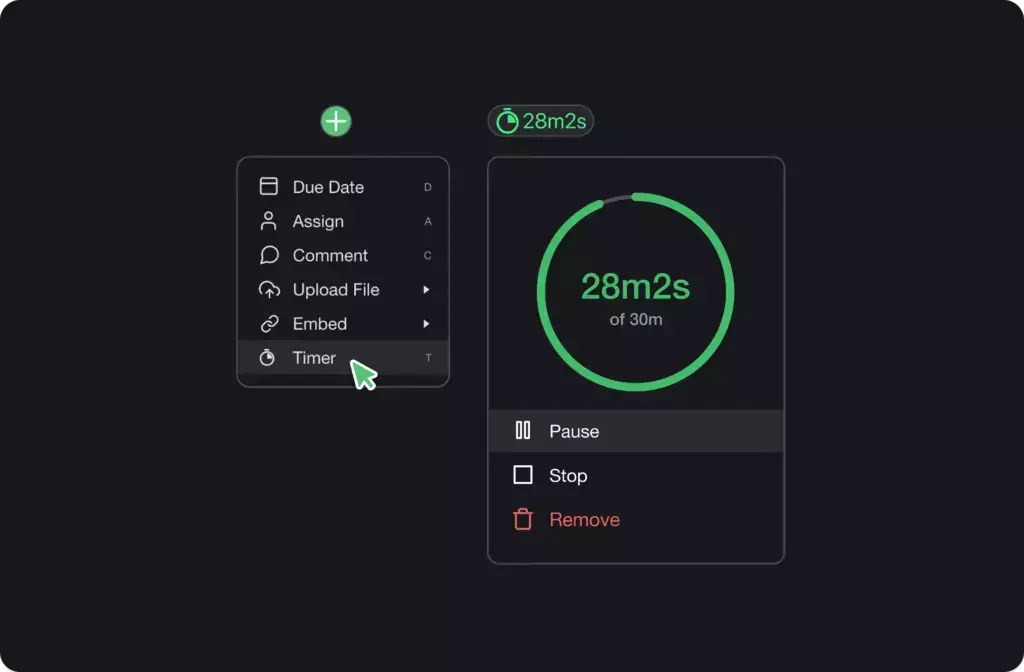
Taskade features a handy Pomodoro timer. Simple type /timer and get work done!
6. Optimize Your Workflow
Procrastination is sometimes a byproduct of poor workflow choices.
For instance, an average knowledge worker switches between 10 different apps. And that’s not counting dozens of websites and web-based services you visit each day. All that adds up to a large pool of distractions and multitasking opportunities that make it difficult to get work done.
If you want to beat procrastination, you need to optimize your workflow. You can do that in three ways—by cutting down on apps, using integrated solutions, or blocking distractions.
Here are three apps that'll help you do just that.
🐑 Taskade AI (AI-Powered Task and Project Management)
Are you tired of switching between multiple apps to keep track of tasks, projects, and conversations? Taskade is an integrated project & task management app that does it all!
🤖 Brainstorm, plan, and organize using a powerful AI Assistant.
🌟 Keep track of tasks, projects, and conversations
☝️ Reduce app switching and switching penalty
⏱️ Track time with a built-in countdown timer
🗓️ See upcoming meetings and events in one place
☁️ Store documents, bookmarks, and other files
And much more!
You don’t have to pay for multiple apps to get work done. Instead of using several apps for video conferencing, projects, and tasks, you can use one simple solution that does it all.
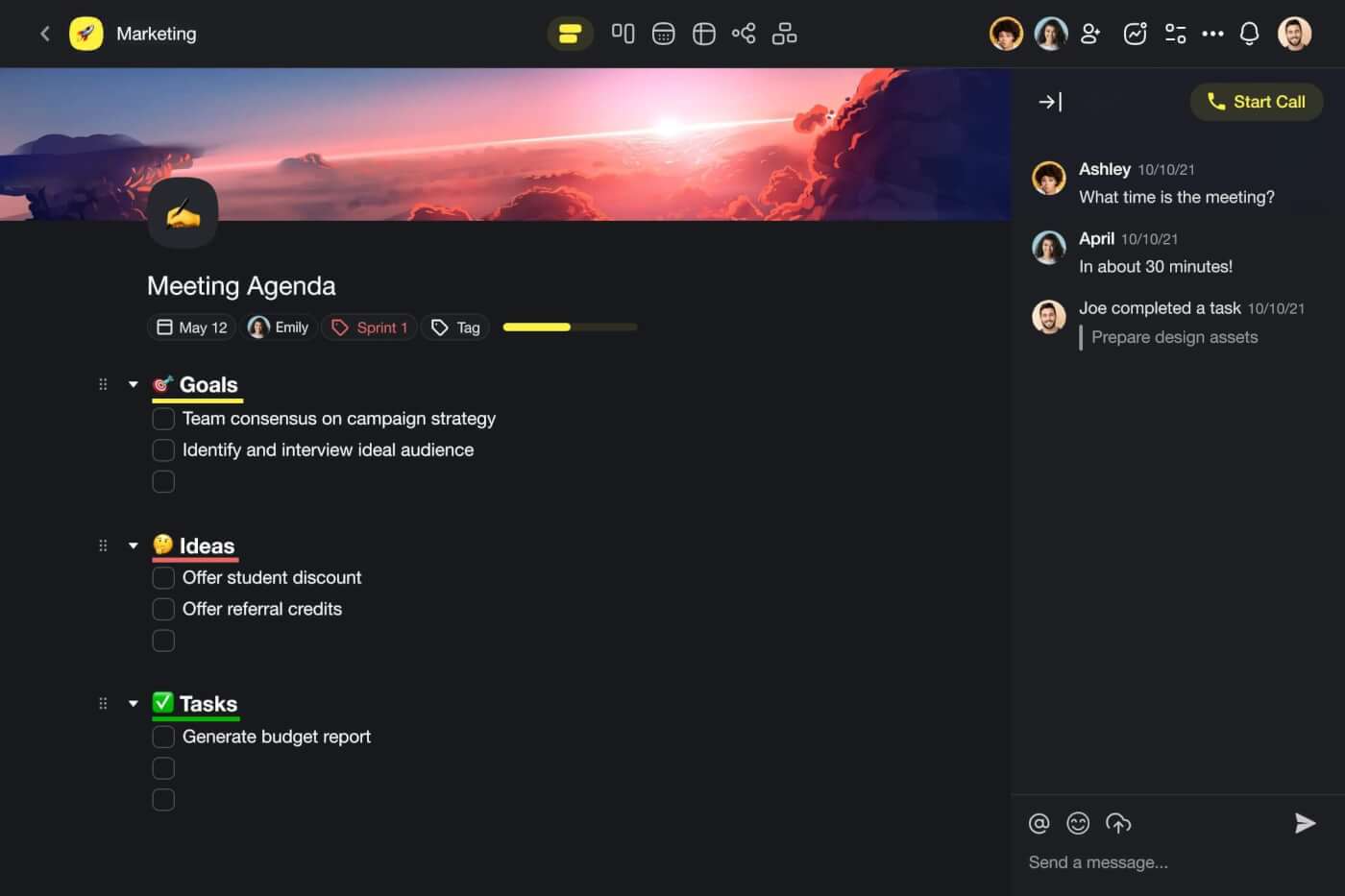
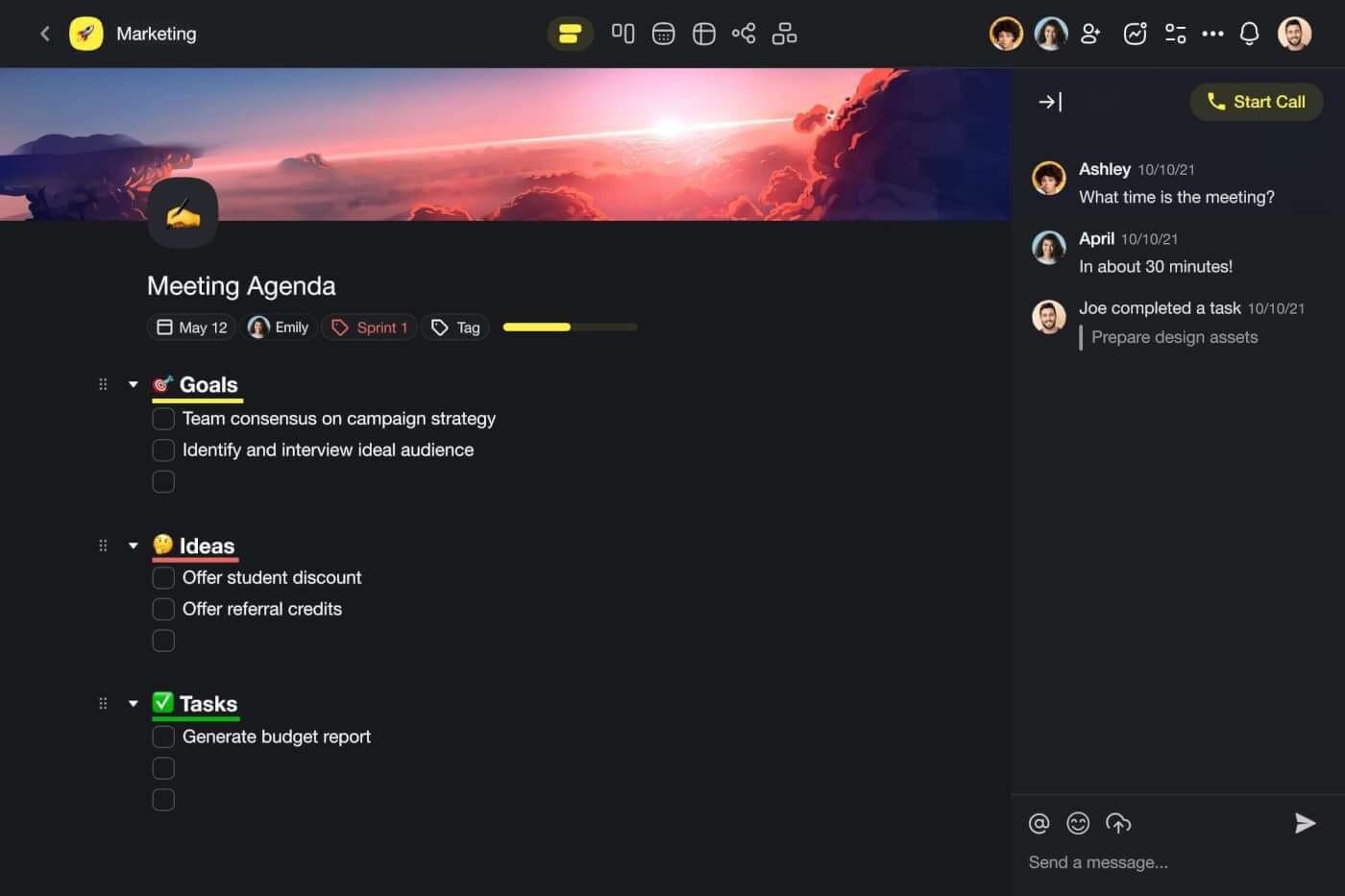
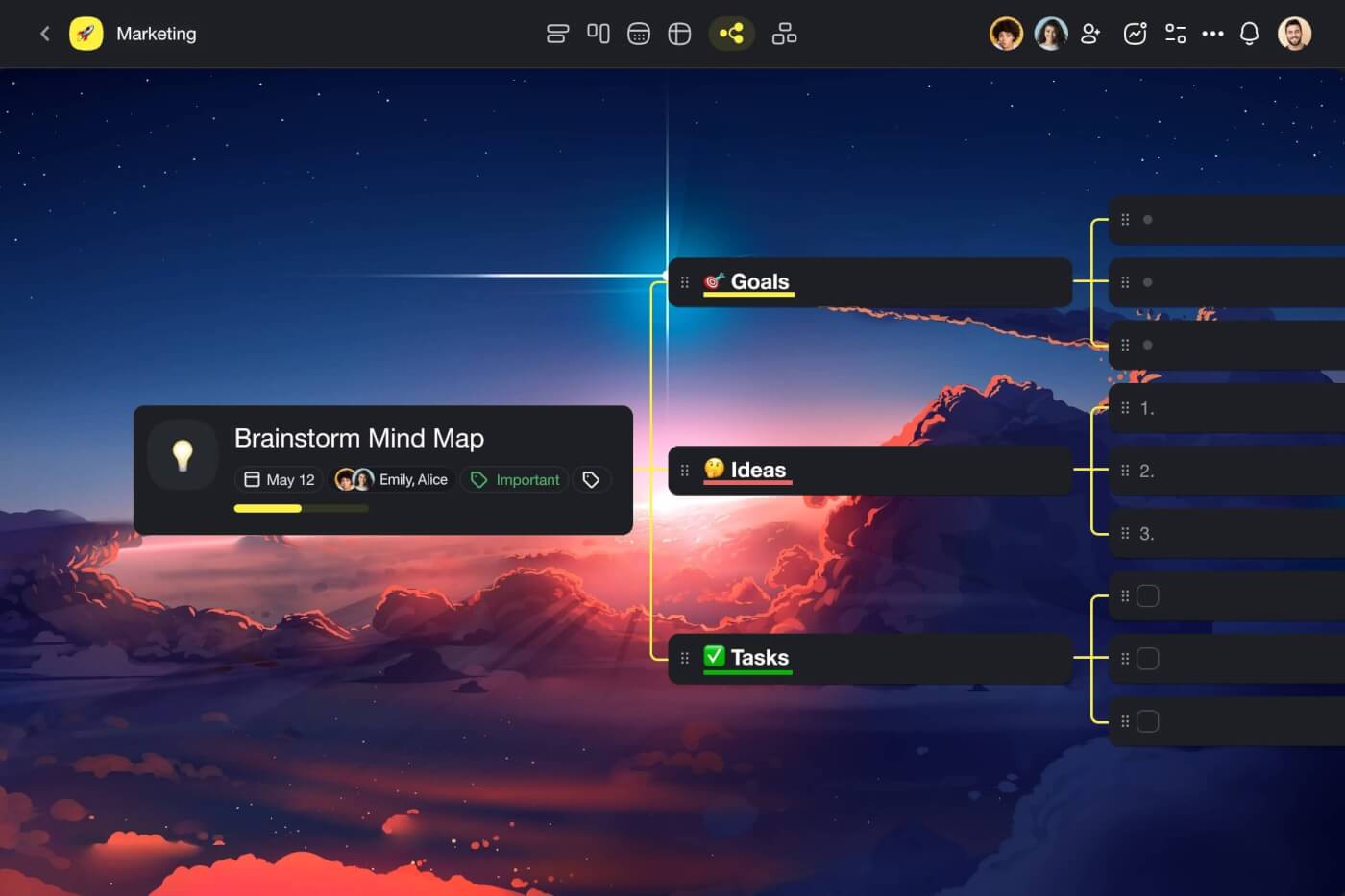
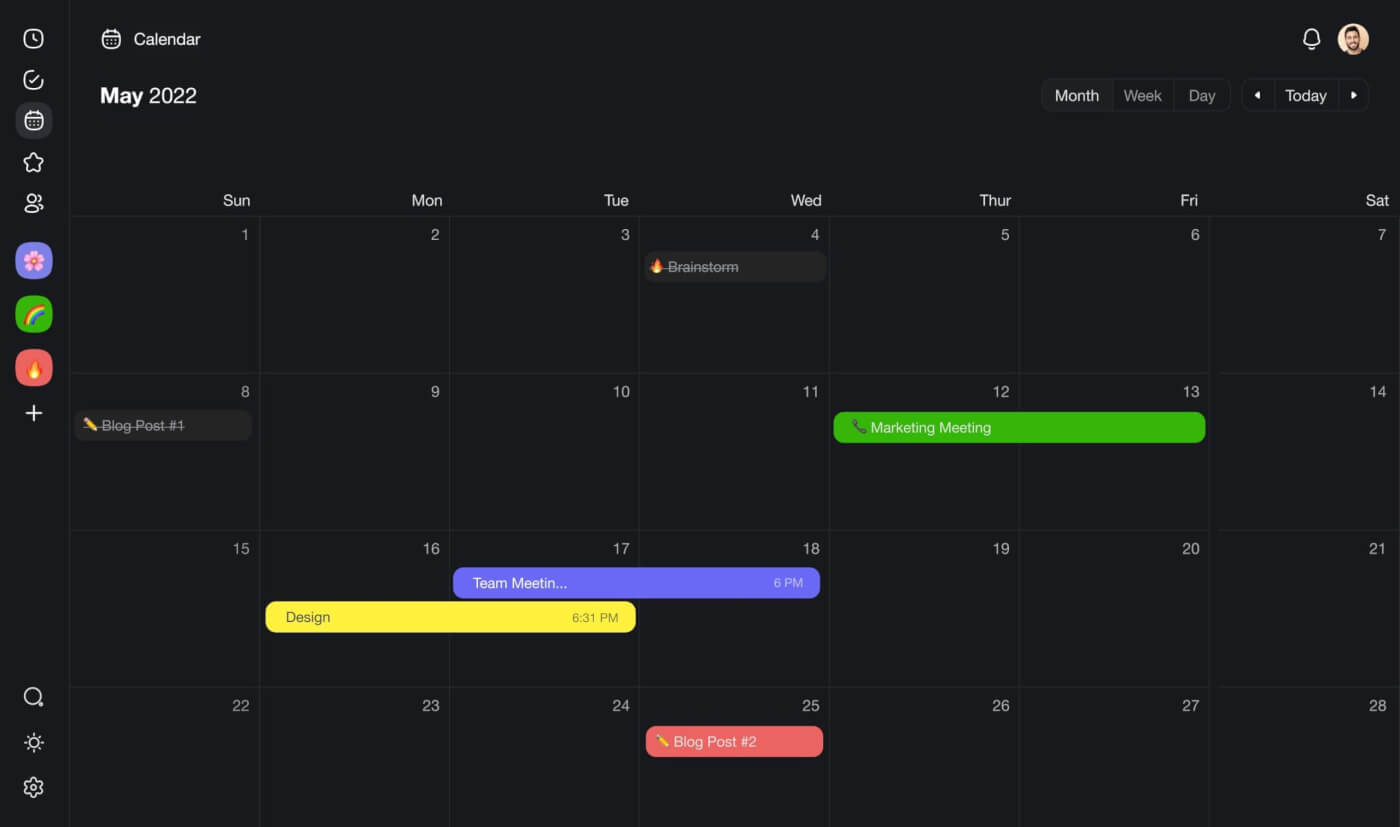
Taskade is simple but powerful. With projects, tasks, documents, and conversations in one place, you can cut down the number of tools you use each day. There are no third-party integrations or add-ons to install. Taskade gives you everything you need to get stuff done!
🚀 Ready to stop procrastinating?
Create a free Taskade AI account today!
🛑 Freedom (Block Distracting Apps and Websites)
Freedom is one of the best distraction-blocking apps available today. It lets you block specific services like news and social websites when you need to focus on work. Freedom is available for Mac, Windows, Android, iOS, and as a browser extension for Chrome.
⏰ RescueTime (Discover How You Spend Your Time)
RescueTime records how much time you spend in different apps and on specific websites so you can better understand your (un)productive habits. Once you've learned how you use your time, you can work on optimizing your workflow and reducing procrastination.
7. Be Honest With Yourself and Take Action
What’s stopping you from making progress? Is it laziness or fear? Or maybe both?
When we feel afraid, we tend to avoid things that might cause us harm. So when we face an important task like studying for exams, we may try to put off doing it until later. We don't want to start studying now because we're scared that we won't be able to handle it.

It's easy to tell yourself that you will not do something until you've worked out exactly how you will do it. And once you've got an idea of how long it will take, you might decide that it's too hard to work on right now. This is one of the reasons why procrastination is so dangerous.
So procrastination isn't just bad because it wastes our precious time; it's also bad because it makes us anxious and then gives up before we even begin.
🐑 Parting Words
Sometimes we put off tasks because they seem boring or unimportant. Other times, we're afraid of failure or rejection. Whichever is the case for you, we hope the tips from this article will help you stop procrastinating and get more done in work and personal life.
Enjoyed this guide? Check these resources next: 👇
⚡ Supercharge Your Workflow With These Classic Productivity Methods
🧘♂️ Simple Productivity Tools to Empower ADHD Employees Working Remotely
🔄 Your Work From Home Routine Needs Self-Discipline, Not Motivation
⏰ Free Task Prioritization Template
Frequently Asked Questions About Procrastination
What is the real meaning of procrastination?
Procrastination is the act of delaying or postponing tasks or decisions, often unnecessarily. It involves choosing to do less urgent or more enjoyable activities instead of more important ones. This habit can lead to stress, missed opportunities, and decreased productivity.
How do you explain procrastinating?
Procrastinating is when you put off tasks or decisions that you know you need to complete. Instead of tackling these responsibilities, you might find yourself engaging in less important or more enjoyable activities. It often happens due to fear of failure, feeling overwhelmed, or simply not wanting to do the task.
What is the main cause of procrastination?
The main cause of procrastination is often a combination of psychological factors such as fear of failure, perfectionism, and feeling overwhelmed by tasks. Lack of motivation, poor time management skills, and unclear goals can also contribute. Identifying these underlying issues can help you develop effective strategies to address and overcome procrastination.
Is procrastination being lazy?
Procrastination is not the same as being lazy. While laziness involves an unwillingness to do any work, procrastination often involves putting off specific tasks despite knowing their importance. People who procrastinate might still be busy with other activities that feel less daunting or more enjoyable.
🔗 Resources
